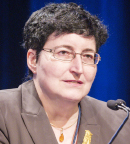
Martine Extermann, MD, PhD
As invited discussant of the GAMMA-1 trial, Martine Extermann, MD, PhD, of Moffitt Cancer Center and Research Institute, Tampa, Florida, first commented on the “teaser” in the findings—the potential for benefit of andecaliximab in older patients. “The drug works better in older patients. As a geriatric oncologist, I don’t hear that very frequently!” she said.
According to Dr. Extermann, there may be a biologic rationale for this finding. It is possible, she maintained, that levels of matrix metalloproteinase 9 (MMP9) may be higher in older patients, and this could be driving the association.
MMP9 Levels and Aging
There are data, mainly in mouse models, showing that levels do increase with age, but human studies are rare and inconclusive. It has also been shown that MMP9 levels are increased in some nonmalignant diseases, such as rheumatoid arthritis and obstructive sleep apnea. If they are surrogates for comorbidities, it is possible that levels increase with age as a result of frequent comorbidities, and this underlies the association, Dr. Extermann suggested.
“Patients with comorbidities may be more responsive to treatment…. It would be interesting to know more about the comorbidities of the study patients and whether they correlate with outcomes,” she said. “My question to the investigators is whether they have serum samples available to test MMP9 levels. We could check to see whether patients with higher levels had better responses to andecaliximab.”
Dr. Extermann took the opportunity to comment on the need for research that is not completely tumor-focused but takes into account the whole patient. “We should look at the broader spectrum of precision medicine,” she said. ■
DISCLOSURE: Dr. Extermann has received research funding from GTx.

